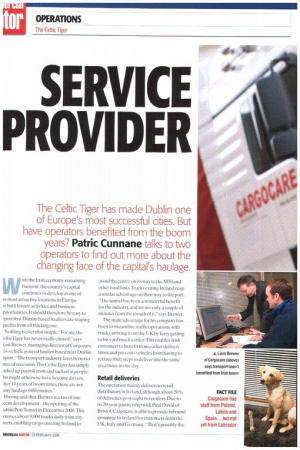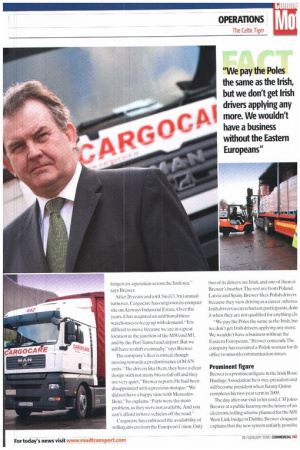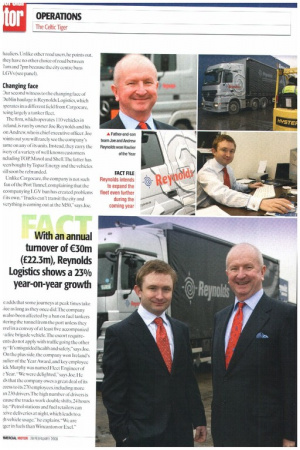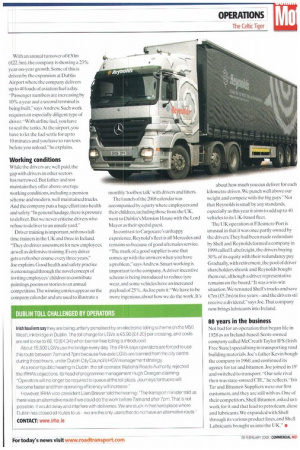SERVICE PROVIDER
Page 38

Page 39

Page 40

Page 41

If you've noticed an error in this article please click here to report it so we can fix it.
The Celtic Tiger has made Dublin one of Europe's most successful cities. But have operators benefited from the boom
years? Patric Cunnane talks to two
operators to find out more about the changing face of the capital's haulage.
4,1 ith the Irish economy remaining buoyant. the country's capital continues to develop as one of le most attractive locations in Europe -it. both leisure activities and business pportunities. It should therefore be easy to Tort that Dublin-based hauliers are reaping enetits from all this largesse.
Nothing is ever that simple. 'For me, the 'eltic Tiger has never really existed," says jam Brewer, managing director of Cargocare. 14-vehicle general haulier based near Dublin rport."The transport industry fares better in mes of recession.The Celtic Tiger has simply ushed up payroll costs and sucked in people ho might otherwise have become drivers. .ftcr 10 years of boom times. there are not any haulage millionaires."
Having said that. Brewer is a fan of one :cent development-the opening of the ublin Port Tunnel in December 2006.This -moves about 9,000 trucks daily from city reets, enabling cargo entering Ireland to avoid the centre on its way to the M50 and other road links. Trucks exiting Ireland reap a similar advantage on their way to the port. -The tunnel has been a wonderful benefit for the industry, and we are only a couple of minutes from the mouth of i t," says Brewer.
The main advantage for his company has been to streamline traffic operations, with trucks arriving from the UK by ferry getting to his yard much earlier.This enables Irish customers to benefit from earlier delivery times and prevents vehicles from having to retrace their steps to deliver into the same area twice in one day.
Retail deliveries
The operation mainly delivers to retail distributors in Ireland, although about 20% of deliveries go straight to retailers. Due to its 20-year partnership with Paul David of Bristol,Cargocare is able to provide inbound groupage to Ireland for customers from the UK, Italy and Germany. "That's possibly the longest co-operation across the Irish sea," says Brewer.
After 26 years and a €4.5m (£13m) annual turnover, Cargocarc has outgrown its compact site on Airways Industrial Estate. Over the years, it has acquired an additional three warehouses to keep up with demand. "It is difficult to move because we are in a great location at the junction of the M50 and MI, and by the Port 'flannel and airport. But we will have to shift eventually,says Brewer.
Ilie company's fleet is mixed, though moving towards a predominance of MAN units. The drivers like them, they have a clear design with not many bits to fall off and they are very quiet," Brewer reports. He had been disappointed with a previous marque:"We did not have a happy time with MercedesBenz,he explains. 'Parts were the main problem, as they were not available. And you can't afford to have vehicles off the road."
Cargocare has embraced the availability of willing drivers from the European iInion. Only two of its drivers are Irish, and one of them is Brewer's brother:The rest are from Poland, Latvia and Spain. Brewer likes Polish drivers because they view driving as a career, wherea Irish drivers seem reluctant participants, doin it when they are not qualified for anything els "We pay the Poles the same as the Irish,bui we don't get Irish drivers applying any more. We wouldn't have a business without the Eastern Europeans: Brewer contends. The company has recruited a Polish woman for th office to smooth communication issues.
Prominent figure Brewer is a prominent figure in the Irish Road Haulage Association: he is vice-president and will become president when Jiminy Quinn completes his two-year term in 2009.
The day after our visit to his yard, CMjoine• Brewer at a public hearing on the future of an electronic tolling scheme planned for the M5( West Link bridge in Dublin. Brewer eloquent explains that the new system unfairly penalise hauliers. Unlike other road users, he points out, they have no other choice of road between 7arn and 7pm because the city centre bans LCIVs (see panel).
Changing face
Jur second witness to the changing face of Dublin haulage is Reynolds Logistics, which iperates in a different field from Cargocare, -icing largely a tanker fleet.
The firm,which operates 110 vehicles in .reland, is run by owner Joe Reynolds and his on Andrew, who is chief executive officer. Joe ioints out you will rarely see the company's lame on any of its units. Instead, they carry the ivery of a variety of well known customers ncluding TOP. Maxol and Shell.The latter has ieen bought by Topaz Energy and the vehicles vill soon be rebranded, Unlike Cargocare, the company is not such fan of the PortTininel,complaining that the ccompanyingLOV ban has created problems its own.-Trucks can't transit the city and very-thing is coming out at the M50," says Joe.
e adds that some journeys at peak times take iice as long as they once did.The company is also been affected by a ban on fuel tankers itering the tunnel from the port unless they ivel in a convoy of at least five accompanied + a tire brigade vehicle.The escort requireents do not apply with traffic going the other iy."It's misguided health and safety." says Joe. On the plus side, the company won Ireland's aulier of the Year Award, and key employee ick Murphy was named Fleet Engineer of Year. "We were delighted," says Joe. He ds that the company owes a great deal of its cc.ess to its 270 employees, including more in 230 drivers.The high number of drivers is cause the trucks work double shifts, 24 hours lay."Petrol stations and fuel retailers can :eive deliveries at night, which leads to a ;h vehicle usage," he explains. "We are ;ger in fuels than Wincanton or Exel." With an annual turnover of €30m (22.3m). the company is showing a 23% year-on-year growth. Some of this is driven by the expansion at Dublin Airport where the company delivers up to 40 loads of aviation fuel a day. "Passenger numbers are increasing by 10% a year and a second terminal is being built," says Andrew. Such work requires an especially diligent type of driver."With airline fuel, you have to seal the tanks.At the airport, you have to let the fuel settle for up to 10 minutes and you have to run tests before you unload," he explains.
Working conditions
While the drivers are well paid, the gap with drivers in other sectors has narrowed. But father and son maintain they offer above-average working conditions, including a pension scheme and modem, well maintained trucks. And the company puts a huge effort into health and safety "In general haulage, there is pressure to deliver. But we never criticise drivers who refuse to deliver to an unsafe yard."
Driver training is important, with two fulltime trainers in the UK and three in Ireland. "They do driver assessment for new employees, as well as defensive training. Every driver gets a refresher course every three years," Joe explains. Good health and safety practice is encouraged through the novel concept of inviting employees' children to contribute paintings, poems or stories to an annual competition.The winning entries appear on the company calendar and are used to illustrate a month ly'toolbox talk' with drivers and fitters.
The launch of the 2008 calendar was accompanied by a party where employees and their children, including those from the UK, went to Dublin's Mansion House with the Lord Mayor as their special guest.
In contrast to Cargocare's unhappy experience, Reynold's fleet is all Mercedes and remains so because of good aftersales service. "The mark of a good supplier is one that comes up with the answers when you have a problem," says Andrew. Smart working is important to the company.A driver incentive scheme is being introduced to reduce tyre wear, and some vehicles have an increased payload of 25% .As Joe puts it: "We have to he more ingenious about how we do the work. It's about how much you can deliver for each kilometre driven.We punch well above our weight and compete with the big guys." Not that Reynolds is small by any standards, especially as this year it aims to add up to 40 vehicles to its UK-based fleet.
The UK operation at Ellesmere Port is unusual in that it was once partly owned by the drivers.They had been made redundant by Shell and Reynolds formed a company in 1999 called Lubefreight, the drivers buying 30% of its equity with their redundancy pay. Gradually, with retirement, the pool of driver shareholders shrank and Reynolds bought them out, although a driver representative remains on the board. "It was a win-win situation.We rerouted Shell's trucks and save (L5.2m) in five years— and the drivers stil receive a dividend," says Joe. That company now brings lubricants into Ireland.
80 years in the business
Not bad for an operation that began life in 1928 as an Ireland-based. Scots-owned company called McCreath Taylor IFS (Irish Free Suite) specialising in transporting road building materials. Joe's father Kevin bough the company in 1960, and continued its agency for tar and bitumen. Joe joined in 19' and switched to transport. "Our sole rival then was state-owned CIE," he reflects. "Iris Tar and Bitumen Suppliers were our first customers, and they are still with us. One of their competitors, Shell Bitumen, asked us t. work for it and that lead to petroleum, diese and lubricants. We expanded with Shell through its various product lines, and Shell Lubricants brought us into the UK." •




































































































































































